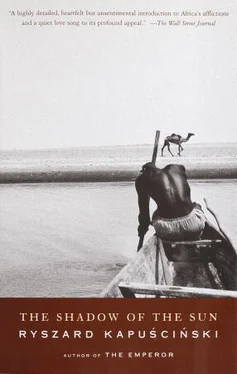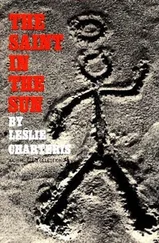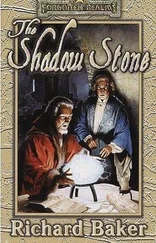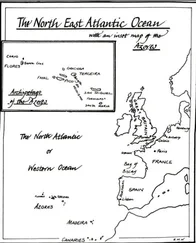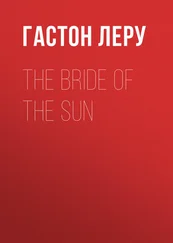I went to the Indian quarter. But what was I to do here? Where was I to go? Who was there for me to talk to? The heat was dreadful, and it was impossible to walk for any length of time: there is no air to breathe, your legs grow weak, your shirt drips with sweat. After an hour of wandering around, you are fed up with everything. You have but one desire left: to sit down somewhere in the shade. Better yet, beneath a fan. And then a thought strikes you: do the inhabitants of the North appreciate what a treasure they possess in that gray, drab, perpetually cloudy sky, with its one great, miraculous advantage — that there is no sun in it?
My main goal, of course, was the African suburbs. I had their names written down. I had the address for the office of the ruling party, TANU (Tanganyika African National Union). But I couldn’t find it. Identical streets, sand up to your ankles, children who won’t let you pass, crowding around you, amused, aggressively curious — a white man in these inaccessible back alleys is a sensation and a spectacle. With each step I lose my confidence. I feel the attentive gaze of men sitting idly in front of houses, following me with their eyes. The women don’t look, turning their heads away: they are Muslims, dressed in black, loosely draped gowns called bui-bui, which completely conceal their bodies as well as part of their faces. The irony of the situation is that even if I were to strike up a conversation with one of the Africans and wished to talk further to him, we would have nowhere to go. The good restaurant is for Europeans, the bad one for Africans. They never frequent each other’s establishments; it isn’t the custom. Each one would feel ill at ease if he found himself in a place inconsistent with the dictates of apartheid.
Now that I had a powerful, four-wheel-drive vehicle, I could set off. And there was reason to: in early October, a neighbor of Tanganyika’s, Uganda, was gaining its independence. The wave of liberation was sweeping the entire continent: in one year alone, 1960, seventeen African countries ceased being colonies. And this process was continuing, though at a diminished pace.
From Dar es Salaam to Uganda’s capital, Kampala, where the ceremony was to take place, is three days’ solid driving, going from dawn to dusk at maximum speed. Half the route is asphalt, the other half consists of reddish laterite roads, called African graters because they have a crenellated surface over which you can only drive fast, so as to skim over the tops of the crenellations.
A Greek went along with me, Leo — a part-time broker, part-time correspondent for various Athenian newspapers. We took four spare tires, two barrels of gasoline, a barrel of water, food. We set out at dawn, heading north, to the right of us the Indian Ocean, invisible from the road, to the left first the massif of Nguro, and then, for the rest of the way, the plain of the Masai. Both sides of the road are dense with greenery. Tall grasses, thick, fleecy shrubs, spreading umbrella trees. It’s this way all the way to Kilimanjaro and the two little towns nearby, Moshi and Arusha. In Arusha we turned west, toward Lake Victoria. Two hundred kilometers on, the problems started. We drove onto the enormous plain of the Serengeti, the largest concentration of wild animals on earth. Everywhere you look, huge herds of zebras, antelopes, buffalo, giraffes. And all of them are grazing, frisking, frolicking, galloping. Right by the side of the road, motionless lions; a bit farther, a group of elephants; and farther still, on the horizon, a leopard running in huge bounds. It’s all improbable, incredible. As if one were witnessing the birth of the world, that precise moment when the earth and sky already exist, as do water, plants, and wild animals, but not yet Adam and Eve. It is this world barely born, the world without mankind and hence also without sin, that one can imagine one is seeing here.
This mood of elation quickly dissipated in the fact of the realities and riddles of the journey. The first, most important question was, which way should we go? For when we emerged onto the great plain, what was heretofore a single broad trail suddenly forked into several identical-looking dirt paths, all leading in entirely different directions. And no guidepost, sign, or arrow in sight. The plain smooth as a tabletop, overgrown with tall grasses, no mountains or rivers, no natural orientation points of any kind, only this unending, increasingly unreadable, tangled net of trails.
There weren’t even any intersections, but every few kilometers, sometimes every few hundred meters, more and more radiating tentacles, coils, and knots, from which secondary offshoots of the same kind branched out chaotically this way and that.
I asked Leo what he thought we should do, but he just looked about uncertainly and answered my question with an identical one. We drove on randomly, choosing roads that seemed to head west (and therefore toward Lake Victoria), but whichever the road, suddenly, after several kilometers and for no apparent reason, it would begin to turn in some unknown direction. Utterly confused, I would stop the car, wondering, now where? It was an especially urgent question, since we had neither a detailed map nor even a compass.
Soon, a new difficulty developed, for noontime arrived, and with it the hours of the greatest heat, when the world sinks into insensibility and silence. Animals seek shelter in the shade of trees. But the herds of buffalo have nowhere to hide. They are too large, too numerous. Each might be a thousand strong. Such a herd, in the hour of the greatest heat, simply grows motionless, dead still. It so happens that one has frozen this way precisely on the road along which we want to drive. We approach. Before us stand a thousand dark, granitelike statues, firmly set on the ground, as if petrified.
A mighty force slumbers in the herd, mighty and — should it explode anywhere near us — deadly. It is the force of a mountain avalanche, only inflamed, frenzied, driven by foaming blood. The zoologist Bernhard Grzimek tells of flying a small plane over the Serengeti and observing for months on end the behavior of buffalo. A lone buffalo didn’t react at all to the whir of the descending plane: it calmly continued grazing. When Grzimek flew over a large herd, however, it was different. It sufficed for there to be among them a single overly sensitive one, a hysteric, a hothouse flower, who at the sound of the engine would start to thrash around waiting to flee. The entire herd would immediately panic and, in terror, begin to move.
And here is just such a herd. What should we do? Stop and stand? For how long? Turn around? It’s too late for that; I am afraid to turn around, for they might rush us. They are fantastically swift, stubborn, and persistent animals. I make a sign of the cross and slowly, slowly, in first gear, the clutch only half engaged, drive into the herd. It is enormous, stretching almost to the horizon. I observe the bulls, who are at the head. Those who are standing in the path of the car begin drowsily, sluggishly to step aside so that the car can pass. They do not move even a centimeter farther than is absolutely necessary, and still the Land Rover is constantly scraping against their sides. I am drenched in sweat as we drive through this minefield. Out of the corner of my eye I look at Leo. His eyes are shut. One meter after another, meter by meter. The herd is silent. Immobile. Hundreds of pairs of dark, bulging eyes in massive heads, filmy, dull, expressionless. The passage lasts a long time, a crossing seemingly without end, but at last we emerge on the other shore — the herd is now behind us, its deep, dark stain against the green surface of the Serengeti growing smaller and smaller.
Читать дальше
